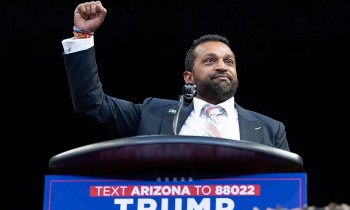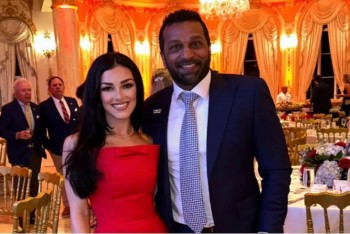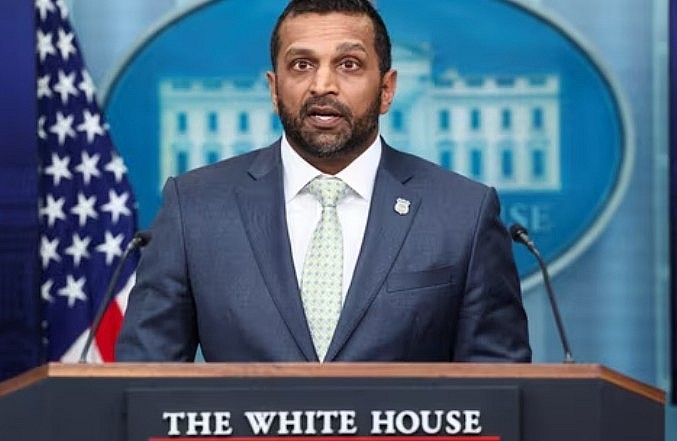White House Slams “Fake” Reports Claiming Trump Is Firing FBI Director Kash Patel
 Who is Kash Patel, FBI Director? Biography, Personal Life, Career and Net Worth Who is Kash Patel, FBI Director? Biography, Personal Life, Career and Net Worth |
 Who is Alexis Wilkins? Kash Patel's Girlfriend: Unveiling the Enigmatic Life of a Rising Star Who is Alexis Wilkins? Kash Patel's Girlfriend: Unveiling the Enigmatic Life of a Rising Star |
White House Pushes Back Against Claims of Patel’s Removal
The White House delivered an unmistakably sharp rebuttal Tuesday after media reports alleged President Donald Trump was considering removing FBI Director Kash Patel from his post. The administration labeled the claims “completely made up,” setting off a new round of scrutiny over the relationship between the Oval Office and the nation’s top law-enforcement agency.
The rumor originated from a Washington-based outlet that cited unnamed sources claiming Trump and senior advisers were frustrated with Patel. According to the report, Patel’s alleged missteps had triggered discussions about replacing him with FBI co-Deputy Director Andrew Bailey.
Within hours, the administration responded with an unusually forceful denial. White House Press Secretary Karoline Leavitt called the story fabricated, stressed that Trump remains “fully satisfied” with Patel’s leadership and insisted there were no internal discussions about his removal.
The controversy has renewed attention on Patel’s turbulent tenure and the broader concerns about political influence on the FBI. Even as the White House tries to shut down speculation, the moment has revived deeper debates about loyalty, oversight and the independence of federal law-enforcement agencies.
 |
| FBI Director Kash Patel speaks during a briefing at the White House |
How the Rumor Gained Traction
The initial report claimed the president was losing patience with Patel after a series of negative headlines involving the FBI. These included criticism over Patel’s public commentary during sensitive investigations, alleged misuse of a government jet for a personal visit, and questions surrounding his management style.
Although the report relied on unnamed aides, its timing and detail gave it enough weight to immediately capture Washington’s attention. Any suggestion of tension between the White House and the FBI director carries significant implications, especially given the history of high-stakes dismissals and clashes between past administrations and the bureau.
Political observers quickly seized on the claim, noting that Patel’s appointment had already been controversial. His critics argued that his loyalty to Trump, his past positions in the intelligence community and his rhetoric during prior political investigations had injected partisanship into an institution designed to remain independent.
As the story circulated online, social media amplified it further, prompting the White House to intervene.
White House Forcefully Rejects the Story
Karoline Leavitt pushed back aggressively. In a post on X, she shared a photo of Trump and Patel inside the Oval Office taken during the same hour the rumor began circulating. She said the president “laughed” when he saw the headline and that the claim had no basis in fact.
Her message was blunt:
“This story is completely made up. President Trump and FBI Director Kash Patel were meeting in the Oval Office at that exact moment.”
Leavitt also emphasized that Patel continues to be a “critical member” of the president’s national security team. The public message was clear: There is no internal move to remove Patel, and the administration wants that understood without ambiguity.
The White House rarely responds this quickly or directly to personnel rumors unless it believes the narrative has potential to cause real political damage. The speed and tone of the denial reveal how sensitive the issue remains.
Why This Matters: A Deeper Look at the Stakes
The controversy is not simply about whether Patel is staying or leaving. It exposes fault lines that have shaped Washington politics for years.
1. Independence of Federal Law-Enforcement
The FBI’s credibility rests on its ability to operate outside partisan pressure. Any rumor of a politically driven removal invites questions about whether the bureau can act freely, especially when its work touches on political investigations.
Patel already faced scrutiny during his confirmation hearings, where he declined to make blanket commitments about avoiding politically sensitive targets. Critics argued his stance signaled a willingness to align the bureau more closely with presidential preferences.
2. Internal Stability at the FBI
The bureau has experienced years of turnover, internal investigations and external pressure. Patel’s tenure has been marked by calls for structural reform and ongoing questions about morale. A rumor of this scale undermines perceptions of stability no matter how forcefully it is denied.
3. Media, Leaks and Information Warfare
The episode highlights how quickly political narratives spread in the capital. A single anonymously sourced report can trigger a national conversation and force institutions to respond.
Washington has always been a place where trial balloons float, leaks serve political purposes and misinformation sparks chain reactions. This incident illustrates how fragile the information ecosystem has become.
4. Patel’s Public Image
Patel’s history makes him a lightning rod for controversy. His critics point to comments that appeared sympathetic to conspiracy-driven communities, his role in intelligence-related investigations and his involvement in discussions surrounding the events of January 6, 2021.
Every new controversy adds to that weight, and even unverified rumors take root faster when the subject already carries political baggage.
What Remains Unknown
Despite the White House’s insistence that the story is false, several unanswered questions linger:
-
Why did the rumor surface now?
The FBI is in a period of operational strain and budget pressure. Patel has been outspoken about the bureau’s funding shortfalls, which may have created friction. -
Is there any internal dissatisfaction?
The White House dismissal of the story was unambiguous, but that does not reveal whether private frustrations exist among senior officials. -
Will Patel’s standing change if more controversies emerge?
Rumors can sometimes reflect early signs of political vulnerability. If challenges within the FBI escalate, speculation may return quickly. -
Did someone inside the administration leak the claim intentionally?
If the rumor was a strategic leak, it could suggest deeper factional divides.
Possible Paths Forward
With the denial issued, several scenarios could unfold:
Scenario 1: The Controversy Fades Quietly
If no new developments surface, the story will likely disappear from headlines within days. The White House clearly hopes for this outcome and has already framed the episode as fiction.
Scenario 2: Continued Speculation
If additional anonymous sources or internal documents emerge, the issue could gain new life. Washington tends to treat every rumor as an ember that might flare up again.
Scenario 3: A Real Policy or Personnel Shift Later
Even though the administration denies the current rumor, political dynamics change quickly. A future misstep by Patel or a major FBI controversy could lead to genuine discussions about leadership change.
A Broader Tension: Executive Power vs Agency Independence
This moment underscores an enduring challenge in American governance. Presidents rely on the FBI to enforce federal law, but they must respect the bureau’s independence. Meanwhile the FBI must navigate an environment where political pressures, public skepticism and internal disputes collide.
Kash Patel’s direct association with Trump complicates the balance. Supporters see him as a disciplined reformer. Critics see him as an instrument of presidential ideology. Both perceptions shape how any rumor about him is interpreted.
This incident reveals how fragile trust is around federal institutions and how easily the narrative can shift from administrative routine to political turmoil.
Key Takeaways
-
The White House issued a swift and emphatic denial that Trump plans to remove FBI Director Kash Patel.
-
The rumor originated from an anonymously sourced media report that alleged internal frustrations.
-
Patel’s tenure has been marked by controversy, making any suggestion of tension politically explosive.
-
The incident highlights ongoing concerns about agency independence, public trust and political influence over law enforcement.
-
Despite the denial, lingering questions leave room for future speculation.
Frequently Asked Questions (FAQ)
Was Kash Patel actually at risk of being removed?
There is no confirmed evidence that Patel was at risk. The White House claims the story is “completely made up,” and no official documentation or credible statements support the rumor.
Why did the rumor spread so widely?
Because Patel is a highly politicized figure and the FBI remains central to major national controversies, any suggestion of tension draws immediate attention. Anonymous sourcing also fuels speculation.
Does this affect Patel’s credibility as FBI director?
Yes and no. Officially, the White House stands behind him. Publicly, however, repeated controversies and rumors contribute to erosion of trust among critics.
Could Patel still be removed in the future?
Like any Cabinet-level or senior executive official, Patel serves at the pleasure of the president. Future decisions will depend on political dynamics and agency performance.
Why did the White House respond so aggressively?
The administration likely wanted to prevent doubts about leadership inside the FBI and avoid sparking new questions about political influence or instability.























